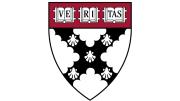“It’s one of life’s ironies that high character is formed at the bottom,” David Bradley, M.B.A. ’77, announced in his Class Day address at Harvard Business School (HBS) on Wednesday.
Bradley is a man of many careers. After interning at the White House and earning his M.B.A. from Harvard and a J.D. from Georgetown, he founded The Advisory Board Company, which provides industry research to companies. He then became publisher of The Atlantic and owner of its parent company, Atlantic Media. There, he was able to create a prominent online presence and put the company back on track to profitability. But at the Class Day ceremony, he focused not on his own story in journalism, but on that of his guest in the audience, Theo Padnos.
Theo Padnos was a freelance journalist taken captive by Al Qaeda while reporting from Syria in 2012. He was tortured—beaten daily, electrocuted, and left in a metal box for 45 days. Bradley and others at The Atlantic had been searching for journalists being held captive, and decided to help Padnos’s family find him. Eventually, they connected with Qatar’s head of national security, who arranged Padnos’s release. Bradley recalled how, afterwards, Padnos seemed to be “living life in a state of gratitude, as if grateful had become his default state.”
Padnos received a standing ovation, and Bradley encouraged the graduates to similarly make the best of it when life takes its darkest turns. “Life is a sine curve,” he said, and the bottom of the curve “can be indescribably hard.” He offered some advice: “There is no escaping the hard hour.” Instead, he said, focus on getting through a shorter time period—be it “a day, or an hour, or just this moment”—and then “do your duty.”
Throughout his speech, Bradley encouraged the graduates to be deliberate when dealing with setbacks. Citing an 80-year-long Harvard study investigating the sources of health and happiness, he stressed to graduates that “how you respond to setback is one of the three great predictors of happiness.”
While Bradley urged graduates to keep moving through difficult times, Class Day student speaker Andrew Cone encouraged his peers to embrace difficult conversations, and to speak up. Cone noted that their voices can have a large influence on the world, and that they must overcome fear to speak on behalf of others: “That’s what leaders who make a difference in the world must do.” He concluded his speech by urging his peers to “find your voice; share your voice; and welcome the voices of others.”









